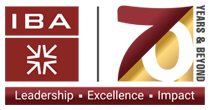SESS organized a talk titled 'Competing Movements of Reform in Muslim South Asia: The Aligarh-Deoband Divide'
January 06, 2023: Department of Social Sciences and Liberal Arts, School of Economics and Social Sciences (SESS), IBA organized a talk titled 'Competing Movements of Reform in Muslim South Asia: The Aligarh-Deoband Divide' by Dr. SherAli Khan Tareen, Associate Professor of Religious Studies at Franklin & Marshall College, USA. The topic of focus was the theological and hermeneutical divisions between the founders of the two most significant Muslim higher educational institutions of South Asia in modern times, Sir Syed Ahmad Khan who founded the Aligarh Muslim University and Maulana Muhammad Qasim Naanautvi who founded the Deoband Madrasah.
The speaker's work centres on Muslim intellectual thought in modern South Asia with a focus on intra-Muslim debates and polemics on crucial questions of law, ethics, and theology. His book Defending Muhammad in Modernity (2020) explored polemics over critical questions of law, theology, and politics among major Muslim 'ulama' in modern South Asia and received the American Institute of Pakistan Studies 2020 Book Prize, besides being selected as a finalist for the 2021 American Academy of Religion Book Award. In his talk, Dr. Tareen conducted a close reading of a dense but immensely profitable exchange of letters between Syed Ahmad Khan and Qasim Naanautvi in 1874 that engaged some major questions of theology, hermeneutics, and the boundaries of Islam as a normative religious tradition. Through this analysis, he presented the conclusion that differences between the two scholars on matters of religious interpretation were not as extreme as is typically imagined, and that there is clear evidence of a respectful and scholarly intellectual exchange between them. He remarked that on many points, the Deoband founder differed from the Aligarh founder in demanding greater methodological caution in matters of theological interpretation, rather than any extreme difference between modernism and conservatism, or reform and stagnation. Dr. Tareen argued that Syed Ahmad Khan's style of argumentation in his letters shows that in many ways, he was also a traditional scholar in the same tradition as Qasim Naanautvi, a fact that Maulana Naanautvi recognised and appreciated. Dr. Tareen emphasised the need for academics to read scholars' religious writings closely in order to appreciate the nature of their arguments more accurately, rather than categorise scholars into vague, Orientalist boundaries of legalist vs 'Sufistic', traditionalist vs modernist, etc., as has been the regrettable practice of many South Asian and Western academic study of religion.
IBA students and faculty appreciated Dr. Tareen's eloquence and diligence. Dr. Syed Jaffar Ahmed, Visiting Faculty, IBA, and Director, Institute of Historical and Social Research, Karachi, praised Dr. Tareen's work and its thoughtful approach in engaging the work of diverse kinds of religious scholars in a thorough way. Dr. Ahmed pointed out the importance of respectful academic debate between different segments of society and the education system, despite of them hailing from religious madrasahs or from Liberal Arts universities in Pakistan or the West. He highlighted the need for more such forums and discussions at Pakistani universities where serious scholars of diverse ideologies can converse with each other in a polite manner to bridge unhelpful and extreme social distances and divides.

